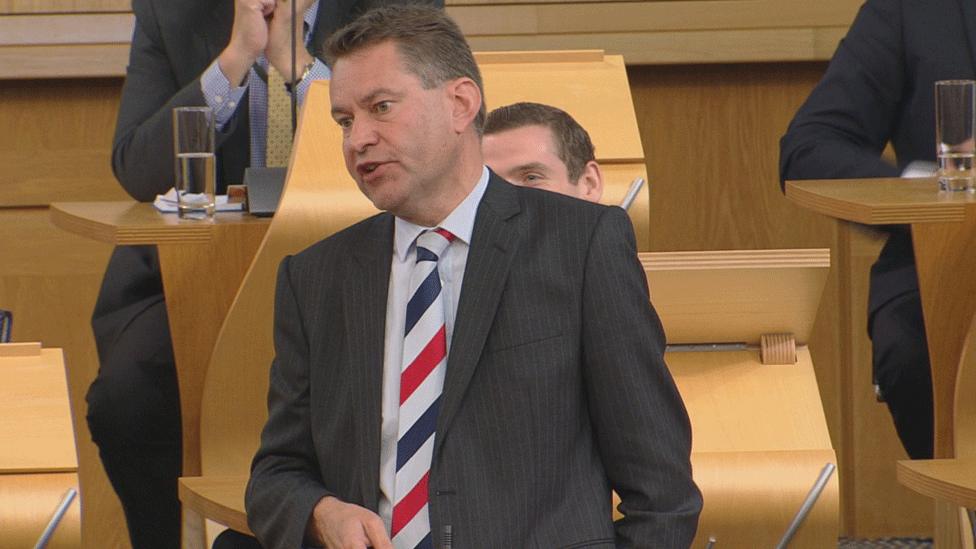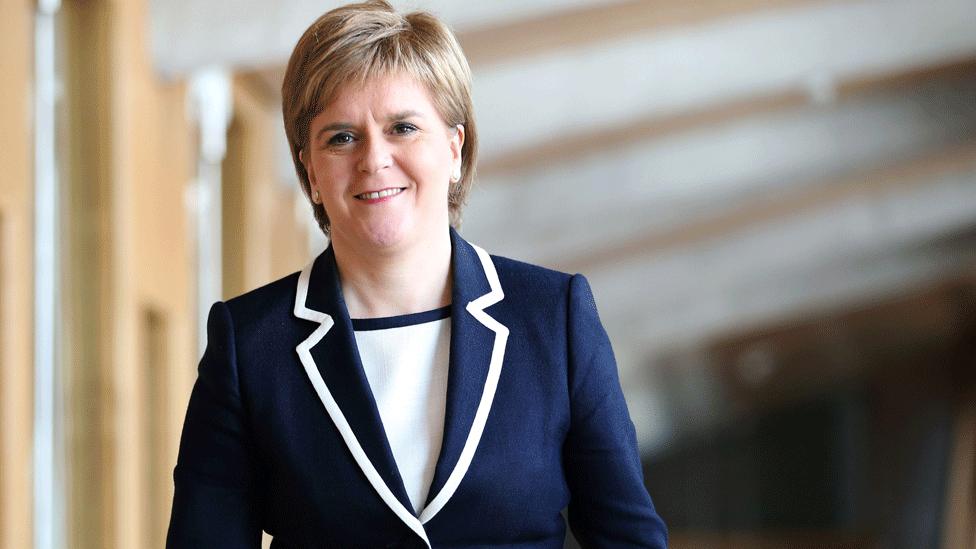First Minister's Questions and the house of fun
- Published
Police investigations of three SNP MPs is raised at Holyrood during first minister's questions
Hands up - who is the funniest MSP? No, not funny peculiar. Put your hands down. Funny as in droll, witty, humorous.
There are several contenders, including one or two who are funny by design, rather than accident. Among that latter contingent, I think few would grudge a medal being accorded to Murdo Fraser.
Indeed, Tories generally have built a proud reputation for wit. Annabel Goldie is delightfully cheeky, even occasionally just a tad risqué. (Just a tad.) Gavin Brown has deft comic timing. But then they have both departed Holyrood.
These days, one looks to Jackson Carlaw for consistent witticisms from the Conservative benches. But quite frequently and certainly today, it was Murdo Fraser who was left declaring: "You've been a great audience, I'm here all week."
The mischievous grin as he rose signalled his intent. With so many SNP MPs helping the police with their inquiries, he began, was the First Minister confident that the force had sufficient resources to cope?
Ok, so Spike Miligan's standing is safe. (My favourite lines from a Milligan script: Where did you join this train? Clapham Junction. But this train doesn't stop at Clapham Junction. You think it was easy!)
Deadpan Dawson
And perhaps you had to be there. But Mr Fraser's lightly understated mischief landed the FM with a dilemma.
She certainly could not join him in repartee.
The question referred obliquely to the fact that MP Natalie McGarry, who resigned the SNP whip, has been charged with fraud; and that SNP MP Chris Law has been questioned by police in relation to financial dealings apparently associated with a campaign he ran during the referendum.
From the outset, Ms McGarry has stressed her innocence and determination to clear her name. With regard to Mr Law, it is emphasised that he has not been charged and it is said on his behalf that the matter will be swiftly resolved.
Still, drollery would not do for the FM. So she resorted to the approach deadpan. And not Les Dawson deadpan. No, the real thing. Ignoring the subtext, she pounced on the apparent substance, issuing an extended, enthusiastic paean about police funding and her administration's role in that regard.
(She had the chance to do the same thing later when she was asked, this time genuinely, about the cops.)

Murdo Fraser quizzed Nicola Sturgeon during FMWs on Thursday

Nicola Sturgeon was taking part in her weekly FMQs
It was all very irritating for the FM. Indeed, it was a day of constant exasperation as she was challenged by opponents to do six impossible things before breakfast. (Ok, it was two or three. And it was lunch. And opponents dispute that they are impossible. But work with me here.)
Labour's Kezia Dugdale referred to the previous evening's chamber vote when MSPs demanded that the Health Secretary call in a series of planned hospital changes - for the purpose of blocking them.
In that debate, Labour's health spokesperson, Anas Sarwar, had solemnly declared that partisan advantage was far from his mind. Aye, as they say in his home city of Glasgow, right.
In essence, he culled together a list of contentious hospital plans - all, of course, vigorously opposed by communities - and presented them as a package to Parliament, demanding action.
In vain did the Health Secretary Shona Robison protest - perhaps, just occasionally, a little too vigorously. She said that the plans were in outline, they might well change, they would be subject to local consultation, they might indeed be called in if appropriate. There was, in short, a procedure in place, accepted and operated by other parties when in power.
Hospital services
Last night the gossip at Holyrood among SNP MSPs was a grudging acceptance that Labour had contrived a neat strategy to put the SG on the back foot. Grudging because they claim it is essentially bogus. But still two reluctant cheers.
However, the SG's defeat in the vote meant that Nicola Sturgeon was ready and waiting. Labour's Kezia Dugdale complained that several SNP members had been returned to Parliament on promises to protect local health services. Now, she said, it was delivery time.
With decided vim, Ms Sturgeon contested this line. Firstly, she argued that the SNP had a better record than Labour for defending local services. Secondly, she said that Labour would be the first to complain if local consultation were to be swept aside for an instant central decision.
On the day, maybe a scoring draw. But there is a bigger issue here. Raised with force by the First Minister. Raised the previous evening with sorrow by the Health Secretary.
The issue is this. Are we saying that every single facility in every single area must be defended? Does the very fact of mounting a protest, however sincerely meant, guarantee that a decision for change must be reversed? If hospital services never change, how do they improve?
This is by no means confined to the current government. I recall previous Health Ministers, perhaps most notably Labour's Malcolm Chisholm, wrestling with this philosophical and political dilemma.
It is the easiest thing in the world to line up alongside a protest group and declare: Give 'em the money, Barney. Instant popularity, at least within a limited zone. But what if the wider health service really needs change, perhaps prioritising primary care or preventative medicine instead?
The exchanges with Ruth Davidson of the Conservatives were comparably frustrating for the FM. But this was at least partly caused by her own government's deferment of a decision.

Scotland's political leaders posed with a giant model of planet Earth to highlight their commitment to tackle climate change
Ms Davidson wanted to give the green light to fracking for shale gas in Scotland. Otherwise, she argued, the lights of whatever hue would risk extinction.
Ms Sturgeon declined. An expert team had been charged with weighing up the evidence for and against fracking. They would produce their report in due course - and there would then be public consultation.
In essence, the debate did not move beyond these two points. But Ms Davidson has an allotted set of questions. Providing Ms Sturgeon with a comparable option of answers. And so they persisted, stepping up the volume.
UK government
To be fair, this is a vital issue of importance to the people of Scotland. It was an entirely legitimate topic, particularly given the arrival of a shipment of imported shale gas. But, on the day, it generated little progress, understandably.
For the Greens, Patrick Harvie pursued the topic of the standard of accommodation for asylum seekers in Scotland. Again, this topic had its limitations. Ms Sturgeon noted that the issue was reserved to Westminster although she voiced her sympathy and promised to work with the Green leader in pursuit of initiatives to mitigate the question.
That reference to Westminster reminds me of another topic. Several SNP backbenchers intervened today, as is their right. Instead of confining themselves to issues controlled by the FM, many if not most sought to invite her to criticise the UK government for one thing or another.
On the day, this tendency drew at least one murmur of discontent from the opposition benches. Still, see above re political strategy. SNP members would say it is entirely legitimate to draw attention to proclaimed failings in the UK structure.
Ms Sturgeon would agree. And, indeed, did.